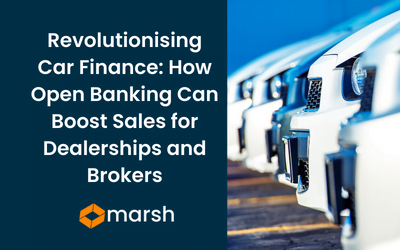In this blog…
What is the difference between open banking and credit scores?
How can open banking benefit car finance intermediaries?
As technology continues to revolutionise the financial industry, open banking has emerged as a game-changer. It is transforming the way intermediaries offer car finance, making it easier for both dealerships and brokers to streamline their customer journeys, leading to more sales and increased profits.

So, what is open banking?
It is a new way of sharing financial data between banks and other financial institutions. It allows intermediaries like car finance brokers to access their customers’ financial data securely and seamlessly. This means that instead of relying solely on credit scores, which can be a blunt instrument, intermediaries can access a wealth of information about their customers’ financial behaviour, such as income, expenditure, and savings. This enables a more accurate assessment of customer’s ability to repay loans, leading to better rates and a higher acceptance rate for car finance applications.

What is the difference between open banking and credit scores?
The key difference between using open banking and relying on credit scores is that open banking offers a much more comprehensive picture of a customer’s financial situation. A credit score is just one piece of the puzzle, and it doesn’t consider a customer’s recent financial history or ability to pay. On the other hand, open banking offers a real-time view of a customer’s financial situation, including income and expenditure data, which can provide a more accurate representation of their ability to repay loans.
Is open banking safe?
One concern that many people have when it comes to open banking is safety. However, the reality is that open banking is exceptionally safe. It is regulated by the Financial Conduct Authority (FCA), and all financial institutions participating in open banking must adhere to strict security protocols. Customers have complete control over their data and must give explicit consent for their financial data to be shared. This means that intermediaries can only access the data that the customer has agreed to share and cannot access sensitive information, such as account passwords.

So, how can open banking benefit car finance intermediaries?
By streamlining the customer journey. With open banking, customers can quickly and easily share their financial data, which means that car finance lenders can make faster and more accurate lending decisions. This leads to a more efficient and frictionless customer journey, increasing customer satisfaction and ultimately leading to more sales.
By leveraging open banking data, intermediaries can also offer their customers more personalised products and services – which is essential under the new consumer duty. For example, if an intermediary knows that a customer has a good track record of saving money, they may be able to offer them a more favourable interest rate on a car loan. This can lead to a better customer experience, resulting in increased customer loyalty and repeat business.

What’s the outlook?
Open banking is an exciting development in the financial industry, and it is set to transform the way car finance intermediaries operate. By offering a more comprehensive view of a customer’s financial situation, open banking can help intermediaries make faster and more accurate lending decisions, leading to more sales and increased profits. As an industry leader in technological adaptation within the motor finance industry, Marsh Finance is well-positioned to help car dealerships and car finance brokers leverage the benefits of open banking.
Rev up your sales and boost your profits – Partner with Marsh Finance today and drive your business to success!
